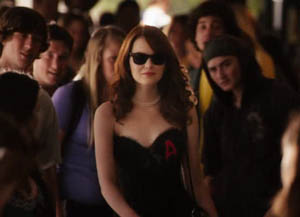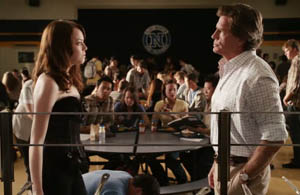|
The high school comedy genre is not one typically revered for its quality scripts or its nuanced humor, so you can imagine my surprise at finding one that actually made me laugh, and quite a lot, at that. You'll have to imagine it, in fact, because the computer ate the first version of my lead paragraph and I'll be damned if I re-type it. 
Olive Pendergast (Emma Stone) has offhandedly invented an imaginary boyfriend as an excuse to duck out of best friend Rhiannon's family camping trip. When pressed to "admit" giving it up to the utterly fictitious George, she mischievously does so, unknowingly within earshot of Marianne, head of the school's Puritanical and hilariously half-witted Cross Your Heart Club, one of those abstinence-only teen groups of the sort that have been repeatedly proven not to actually work at all. Suddenly, all eyes are on her, and having previously been unpopular, if hardly a shrinking violet, she finds she enjoys the attention, received despite having done nothing at all. There's a veritable pantheon of teen sex comedies; I'm fairly certain there's never before been a teen absence-of-sex comedy. Reluctantly at first, and then with greater enthusiasm, Olive starts allowing more and more rumors to spread in return for favors, as the nerdy and disenfranchised line up for pretend deflowerings. I'll be honest here: I have no idea if modern high school life is anything like what's presented here. Does giving it up even once actually mark a girl as either a total slut or a viable opportunity these days? Such things lie well out of range of my personal experience, though it seems about accurate to what teen life was like in the '80s. This is perhaps intentional; if nothing else, it's pretty clear that teen culture is chock full of depictions of teen culture, in that narcisstic way in which we all love a distorting mirror. An early scene riffs heavily on John Hughes' classic Ferris Bueller's Day Off, establishing Olive as a somewhat larger-than-life persona of the sort that comedies beg for (life-size is rarely all that funny). In fact, if there's one bit of pure science fiction I cannot buy into here, it's the notion that Olive, an extremely attractive, shapely babe without even a pair of geek-glasses, could ever escape the attention of teenaged boys, who would notice a cardboard box if it was vaguely feminine. She's quick-witted, always dashing off retorts most of us only think of ten minutes after the fact, and clearly smarter (and older, like the rest of the cast) than any high-schooler you're ever likely to meet. She's also eminently likeable, even when she's doing things of questionable ethical foundation, which is fortunate when she's on screen for about 98 percent of the film. 
As her situation begins, inevitably, to spiral out of control, Olive quietly despairs that "John Hughes didn't direct my life." She might want to rethink that lament in some regards, however. Adults in Hughes films were invariably buffoons, assholes, or just plain clueless, a cold and distant separate species from the young protagonists. Easy A, by contrast, doesn't give short shrift to the parents and teachers in terms of likeability. Olive's parents are amongst the most open-minded screen parents ever, relating to their daughter as a human being, non-judgmental, veritably unshockable, and probably more frank and open than most of us could bear from our own immediate progenitors. Her favorite teacher, the laconic Mr. Griffith, is also a sympathetic personage and has a few comments concerning Facebook junkies with which I could not possibly agree more. There's also the fact that Bueller, icon or no, is more of a cartoon than a serious attempt at depicting a real human being, a figure so much larger than life that he sails through his entire film without changing a hair. Olive isn't invincible, and thus evokes sympathy where her (at least partial) inspiration could not have. The flip side, of course, is that there's the Law of Diminishing Jokes at work here, as the drama needed to create an actual character arc sidelines the humor increasingly as the end approaches. Fortunately, it never does so completely, and one of the best jokes is saved for last; I wouldn't dream of giving it away, but it's one of those that's-just-so-wrong moments that could only come after a lot of careful setup. In addition to the requisite pop culture references, there's also a liberal dose of actual cultural influence, mostly stemming from Nathaniel Hawthorne's The Scarlet Letter. While it's become popular for teen movies to adapt classic literature into a modern setting, here we see the tale of repression and ostracization used more as a springboard to dissect the nature of public life and our perception by others. If anything, Easy A is more about the differences in society between then and now, as Olive proudly displays her faux-harlot identity with red letter "A"s stitched onto her wardrobe. The film also throws many a punch that the Puritans of today will get all in a huff about, though if it was up to me, Sarah Palin would be nailed to a sofa and forced to watch this film on endless repeat until the point gets through, if ever. But mostly, it's a film that managed to make me genuinely laugh quite hard on more than one occasion, which is ultimately what I expect any film filed under "comedy" to strive for. -review by Matt Murray
|
|
||||||||